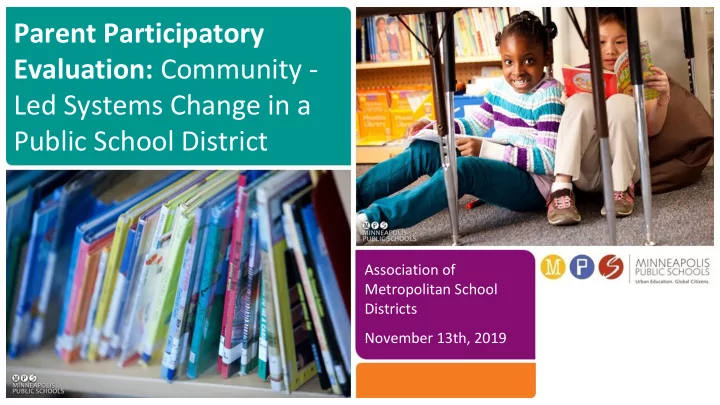

Parent Participatory Evaluation: Community - Led Systems Change in a Public School District Association of Metropolitan School Districts November 13th, 2019
After today, you will... ● Have an understanding of Parent Participatory Evaluation (PPE) and how this research and evaluation approach resulted in parent-led engagement at Minneapolis Public Schools (MPS) ● Hear from some of our parent evaluators ● Gain insight into what it takes for this work to be successful and facilitate change
Overview of PPE
Knowledge and Power “Women or men cannot understand or explain the world we live in or the real choices we have as long as the sciences describe and explain the world primarily from the perspectives of the lives of the dominant groups.” Harding (1991) By recognizing science as a set of local practices it becomes possible to “decentre” it and develop a framework within which all knowledge systems can be equitable compared. Turnball (1997)
Program Overview Minneapolis Public Schools promises an inspirational educational experience in a safe, welcoming environment for all diverse learners to acquire the tools and skills necessary to confidently engage in the global community. To honor this vision, the District has utilized participatory evaluation, which empowers the people who are closest to the issue to take the lead in the evaluation. MPS has supported a Youth Participatory Evaluation (YPE) program for five years, and launched the PPE program last year. By partnering with students and parents, MPS engages key stakeholders to identify opportunities for improvement and partner on innovative solutions that best reflect the priorities of our community .
Engaging the Community in Research ● MPS serves a racially and ethnically MPS Student Demographics diverse community of students and White: 36.4% Black or African American: 34% families Latinx or Hispanic: 17.2% ● MPS has experienced limited success Two or More: 4.8% Asian: 4.7% American Indian: 2.7% engaging these diverse communities Native Hawaiian/Pacific Islander: 0.1% in research and evaluation ● In a recent survey, MPS collected data from over 3,000 family members, but only 16% identified as a person of color , 11% spoke a language other than English at home, and only 14% reported living on the North side of the city.
Participatory Evaluation
PPE Model in MPS is Built on Partnership ● Data collection Research, methods Engagement ● Analysis Evaluation, & & External ● Authentic ● Identifying relationships Assessment Relations Themes ● Parent ● Reporting engagement ● Communication Parent ● Language Evaluators ● Community connections (African American, American Indian, Hmong, Latinx, and Somali) ● Experience with MPS
Research Question + Data Collection How can a school value and respect your child for who they are?
Themes Across Groups For families to feel valued and respected at MPS schools, parents need: 1. Ongoing commitment that staff will learn about and embed students’ cultures and histories into their instruction and schoolwide practices. 2. Positive and accessible communication that builds relationships between parents and teachers to partner in support of each child in MPS. 3. Staff-especially teacher and school leaders-who look like and speak the languages represented in our schools. 4. Programming and courses throughout the academic experience that reflect and value the cultures and histories of MPS students. 5. A system of support that empowers parents to advocate for and support their child’s development, especially within special education. 6. A safe school experience. 7. Clear communication about schools’ expectations for behavior and equitable treatment in response to behavior .
How Have Findings Produced Change? ● Increased budget for Interpretation and Translation services ● Hired additional Recruitment and Retention Coordinator to increase staff of color ● Increased budget for Arts department for more culturally-specific arts displays ● Increased Special Education Cultural Liaisons working weeks to include projects that improve relevancy and accessibility of parent communication ● Added a full time teacher for Hmong language course at Henry High School ● Added a full time teacher for Somali Studies course at Heritage Academy
Parent Evaluator Panel
MPS Parent Evaluators ● Allison Waukau ● Dulce de la Rosa ● Jerry Lee ● Mahamed Cali ● Sarah Washington
Facilitating Systems Change: What does it take?
Systems Change Framework Systems Change Framework (Kania, Kramer, Senge 2018)
Core Component of PPE: Facilitating Use & Action Culturally-Specific 11 Memos with Groups’ Findings & Specific Recommendations Recommendation + for MPS Owner Themes Across Groups
Additional Core Components of PPE Aligned with District Compensating Shared Power Decision-Making Parents Between district staff and Process Providing stipends for the parents Parents gain awareness of work district wide processes Time Evaluation and Need to allot adequate time Engagement to the program (including interpretation and Partnership translation services) and Cross-divisional work and process of progress equity-minded staff monitoring
PPE Adaptations Contract Model Site-Based Model Two-year pilot, starting this Hired PPE graduates to collect year parent voice for Equity and Diversity Impact Assessment on Model will run out of two MPS Student Placement Process. schools in North Minneapolis. Utilizing parents’ prior Initiative will explore the experience and expertise in potential for site-based PPE to collecting data. leverage more tangible change at the school level. Limited choice and parent leadership on design of data collection tools.
Questions? https://rea.mpls.k12.mn.us/parent_participatory_evaluation
Recommend
More recommend